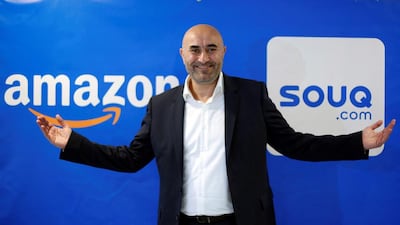The Middle East's e-commerce sector, which is growing at the fastest pace globally with online sales expected to double to $48.8 billion (Dh179.3bn) by 2021, is to expand thanks to a rise in grocery spending.
This expenditure offers a new segment of expansion for e-commerce players, as shoppers' demand for convenience prompts the growth of other consumer sectors and delivery services, according to a report by Fitch Solutions Macro Research, a unit of Fitch Group.
The UAE will be one of the leading players, with e-commerce spending in the country increasing 170 per cent to $27.1bn in 2022, from $9.7bn in 2017.
"Rising incomes will support consumer demand for higher quality food as they move up the price point to purchase more premium food varieties as well as organic food, which tend to be priced higher," said the report.
Consumers are likely to pay for convenience services related to their food purchases, which “includes being receptive to convenience store formats, meal deliveries and online grocery delivery.”
With many young and affluent customers, deep internet penetration and advanced networks for logistics, the Middle East’s e-commerce sector is growing faster than anywhere else in the world.
As of March this year, internet penetration in the region was 64.5 per cent, higher than the global average of 54.5 per cent, according to data by Statista.
Mergers and acquisitions in the sector have also picked up pace in the past year after Amazon acquired Souq.com for $650m in 2017.
Noon.com, the $1 billion joint venture between UAE businessman Mohamed Alabbar and Saudi Arabia's Public Investment Fund, signed an agreement with eBay in June that will enable its customers to purchase products listed online in the United States and other
countries.
__________________
Read more:
Emaar Malls second quarter profit rises 15% and beats analysts' estimates
Exclusive: MAF Retail expects Carrefour expansion to rake in 10% revenue growth
_________________
This Noon initiative is similar to those by other global e-commerce companies such as Amazon, which acquired Whole Foods in June last year for $13.7bn, and Alibaba, which launched its own grocery platform Hema in 2016.
“Noon.com’s expansion into the grocery sector aims to target one of the highest consumer spending segments in the UAE. This expansion into grocery helps to target a different consumer base and appeal to consumer’s needs throughout the day,” said the Fitch report.
But Noon is relatively late to the game in the region. Its competitor e-commerce platforms and grocery majors have been rolling out their online grocery delivery services in recent years.
“Noon.com’s biggest competitor Souq.com has been offering online grocery delivery since 2016, under the brand name of Souq Superstore. While Carrefour, which operates in the Middle East under a franchise partnership with Majid Al Futtaim, already offers online grocery delivery services,” said the Fitch report.
Another dominant grocery player, the Lulu Group, has citywide storage locations and transportation to make door-to-door deliveries. The company will also be strengthening its omnichannel strategy on this front by expanding into pick-up services.
Spinneys, which plans to open 18 more stores in the UAE by 2020, is also looking to launch an online platform in the coming years.


